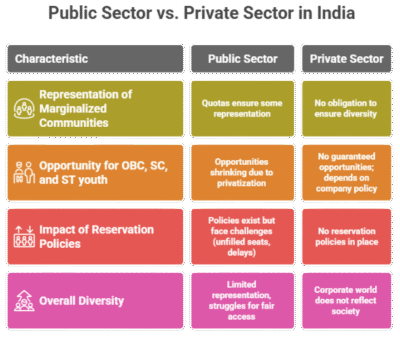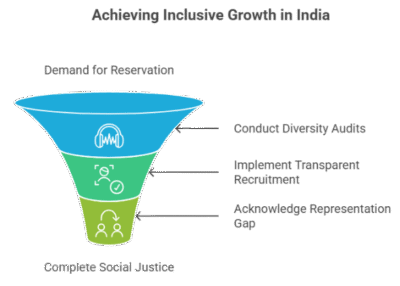Published – September 11, 2025
India is trying to invoke reservation policies for decades to improve access for marginalized communities in education and government jobs. But as the economy changes, one question keeps coming up—should there be reservations in the Private Sector? This is no longer a distant debate. With public jobs shrinking and private companies becoming the main source of employment, the demand is growing louder than ever.
Why Representation in Corporate Jobs Is Missing?
Government jobs, though limited, guarantee some representation through quotas. Yet, for backward communities, this representation is far from enough. The number of posts is shrinking, many seats remain unfilled, and promotions often face unnecessary delays. As a result, even with quotas, backward classes struggle to gain fair access to stable employment. Private companies, on the other hand, continue to hire without any obligation to ensure diversity. The result is a corporate world that does not reflect India’s real social structure.
Reservation in the Private Sector: A Growing Demand
Supporters argue that affirmative action cannot stop at the public sector. As privatization expands, OBC, SC, and ST youth are losing the opportunities that once came from government institutions like railways, banks, and public enterprises. When these are sold or downsized, their reservation policies vanish too. Critics warn that private sector quotas will harm efficiency, but research shows that diversity often improves creativity and decision-making. The issue is no longer about charity; it is about fairness in sharing economic growth.

Shrinking Public Jobs and Rising Inequality
In earlier decades, public employment was a ladder for marginalized groups. Today, contract hiring and outsourcing bypass these safeguards. Public jobs are fewer but inclusive, while private jobs are plenty but exclusive. This imbalance creates a dangerous divide. If India continues on this path, backward communities risk being locked out of the nation’s biggest opportunities for wealth and dignity.
Arguments Against and Their Weakness
The strongest argument raised against private sector quotas is the so-called “merit” principle. Merit is not a level playing field—it is influenced by social and economic privilege. Better schools, coaching, and family networks give some groups a head start. Others argue that companies should not be forced into social responsibility. But many corporations enjoy tax benefits, land subsidies, and government contracts. If they benefit from public resources, is it not fair that they also uphold public values of equality?
Even the policy framers of Reservation/quota never advocate or support inefficiency: It should be a sustainable compliance with reservation and efficiency.

The Way Forward
The demand for reservations in the Private Sector challenges India to think seriously about inclusive growth. A starting point could be diversity audits for large companies, especially those supported by government incentives. Another step could be transparent recruitment systems that reduce bias. What matters most is acknowledging the problem: without representation in corporate spaces, India’s promise of social justice remains incomplete.
India’s Defining Question
As India moves toward becoming a global economic power, the real question is—who benefits from this growth? If prosperity remains in the hands of a privileged few, development becomes hollow. Reservation in the Private Sector may soon become the next major battle in India’s long fight for equality. The answer will decide whether India builds an inclusive future or repeats the exclusion of its past.
The time has come for citizens, policymakers, and businesses to face this challenge. Should India’s growth story exclude millions, or should it embrace true diversity? The choice is ours—but the cost of silence will be borne by generations.
It’s time to demand inclusion, question privilege, and push for policies that make India’s economy fair for all.



